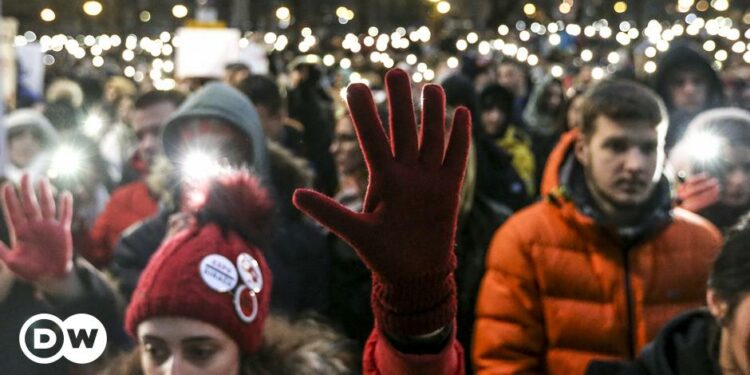Around 5,000 professors and academic staff have joined the students. “Chaos, crime and the rule of ignorance and incompetence — it’s unbearable to watch,” says Ljubica Oparnica, a professor at the Faculty of Education at the University of Novi Sad. She credits the students with restoring her faith that change is possible.
“I am truly fascinated by the way students are working together,” she said. “Their solidarity is a fortress that cannot be breached. If we all share the same vision — and here it is clear that we all want a new system, a new and different era — this regime stands no chance.”
Support has also poured in from the Serbian diaspora worldwide — from New York to Melbourne — with gatherings in major cities around the world. Even tennis star Novak Djokovic voiced his solidarity with the students at the Australian Open.
Citizens are donating food, private businesses are providing essential supplies, taxi drivers are offering free rides, and farmers have pledged to protect protesters with their tractors.
Protestors face growing pressure
Protection might well be necessary, as students are facing increasing pressure. Pro-government tabloids have labeled them “foreign agents” and published personal information about them.
There are also reports that some parents have been visited by intelligence service agents.
Serbia: Thousands join anti-government protests in Belgrade
To view this video please enable JavaScript, and consider upgrading to a web browser that supports HTML5 video
Physical attacks on protesters are becoming more frequent. Tension peaked last Thursday when a man drove a car into a crowd during a silent tribute in Belgrade, hitting a law student who was hospitalized with serious injuries.
“We were shaken, but this won’t scare us. It will only make us angrier,” says Ana Djuric.
Calls for a general strike
The incident has further enraged many citizens, prompting larger protests even in smaller towns across Serbia.
Students see this is an indication that the time is ripe for a general strike. They believe everything must come to a halt for real change to happen. Many have already answered their call.
The Bar Association of Serbia launched a one-week stoppage, while some employees at the state-run electricity company are also preparing to go on strike. According to DW’s sources, medical workers and artists in public institutions are also considering joining.
Teachers out in force
Teachers, with the backing of parents, are suspending classes. Thousands of teaching staff took to the streets of Belgrade on Monday, not only to protest low wages and poor work conditions, but also to show their solidarity with the students.
Although the country’s four biggest teachers’ unions reached an agreement with the Serbian government on salary increases and declared a moratorium on strikes, some schools and teachers have refused to start the second semester.
“Education is not for sale” — teachers staged a demonstration in Belgrade on MondayImage: Filip Stevanovic/Anadolu/picture alliance
“Education cannot thrive in a society plagued by systemic corruption. Education cannot flourish while decision-makers are plagiarists, forgers, usurpers and manipulators,” declared Dusan Kokot of the Independent Union of Education Workers of Serbia.
Unlike the four big teachers’ unions negotiating with the government, Kokot’s union has declared an indefinite work stoppage.
Threat of dismissals
Prime Minister Milos Vucevic warned that inspectors would be sent to schools that go on strike and raised the possibility of dismissals.
“I am not threatening anyone,” said Vucevic. “I am merely urging everyone not to play with children and the education system.”
Two inspectors have already announced their refusal to comply, citing professional and ethical concerns. In one school, all members of staff signed a declaration, saying that they would resign if any one colleague faced repercussions.
Government on the defensive
As protests and solidarity among various social groups grow, the government faces the most significant political crisis of its 12-year rule.
Serbian President Aleksandar Vucic has accused the protesters of undermining constitutional order.
“Foreign instructors are behind all this, coming from several Western countries. We know this for sure. Some even come from Eastern countries, doing dirty work for Western intelligence networks,” he said.
Serbian President Aleksandar Vucic proposed what he called an “advisory referendum” on his presidency — a proposal the opposition rejectedImage: Ciaran McCrickard/Avalon/Photoshot/picture alliance
Vucic proposed what he called an “advisory referendum” on his presidency, which would not necessarily be binding for him. The opposition rejected the proposal and instead demanded a transitional government to ensure fair elections. The ruling Serbian Progressive Party (SNS) has dismissed this idea and launched a campaign entitled “I trust Vucic.”
What happens next?
“Even for the government, a referendum would be a significant challenge,” says political scientist Dusan Spasojevic. He predicts that both sides will stick to informal power struggles.
“It seems that they [the SNS] are preparing for a counter-campaign. There are signs that counter-rallies may begin by the end of the week. I assume this is another mechanism that the Serbian Progressive Party will use to suppress protests,” Spasojevic told DW.
Where Serbia goes from here is uncertain.
For Professor Ljubica Oparnica, the answer is clear: “They won’t give up easily because they enjoy immense privileges. That’s why change seems impossible. But I believe this government will collapse suddenly, like the fallen canopy [at Novi Sad train station]. We’ll all be surprised. I think they’ve reached the end of their strength.”
Although Dusan Spasojevic takes a more cautious view, he believes there is no turning back. “If the government finds a way to weaken the student protests, it may temporarily resolve the crisis. But it will surely resurface with full force at the next opportunity,” he concludes.
Edited by: Aingeal Flanagan
Source link : http://www.bing.com/news/apiclick.aspx?ref=FexRss&aid=&tid=678fd5a0316e40868fd409b148ef2bd0&url=https%3A%2F%2Fwww.dw.com%2Fen%2Fserbia-protests-may-lead-to-general-strike%2Fa-71360278&c=8131644544237959528&mkt=de-de
Author :
Publish date : 2025-01-21 08:09:00
Copyright for syndicated content belongs to the linked Source.


